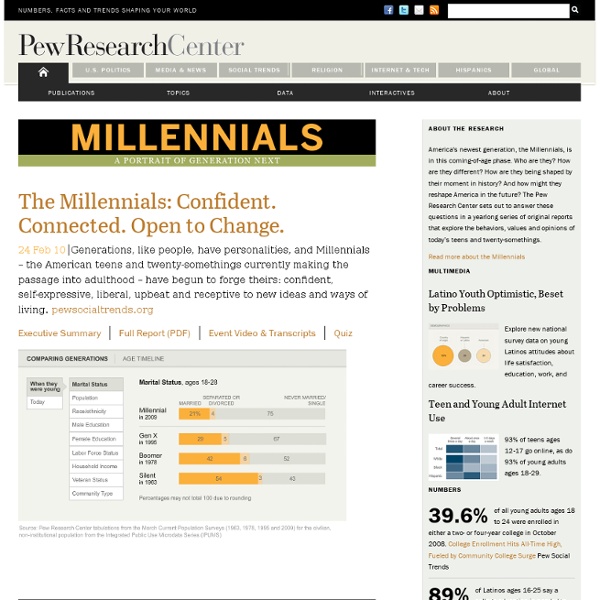Generation Y
Terminology[edit] Authors William Strauss and Neil Howe wrote about the Millennials in Generations: The History of America's Future, 1584 to 2069,[2] and they released an entire book devoted to them, titled Millennials Rising: The Next Great Generation.[3] Strauss and Howe are "widely credited with naming the Millennials" according to journalist Bruce Horovitz.[1] In 1987, they coined the term "around the time 1982-born children were entering preschool and the media were first identifying their prospective link to the millennial year 2000".[4] Strauss and Howe use 1982 as the Millennials' starting birth year and 2004 as the last birth year.[5] Newsweek used the term Generation 9/11 to refer to young people who were between the ages of 10 and 20 years on 11 September 2001. The first reference to "Generation 9/11" was made in the cover story of the November 12, 2001 issue of Newsweek.[17] Traits[edit] William A. Political views compared to other generations[edit] Demographics in the U.S.
The Millennials
by Scott Keeter and Paul Taylor Generations, like people, have personalities. Their collective identities typically begin to reveal themselves when their oldest members move into their teens and twenties and begin to act upon their values, attitudes and worldviews. America’s newest generation, the Millennials,1 is in the middle of this coming-of-age phase of its life cycle. Who are they? The Pew Research Center will try to answer these questions through a yearlong series of original reports that explore the behaviors, values and opinions of today’s teens and twenty-somethings. Even without further research, we already know a few big things about the Millennials. They are the most ethnically and racially diverse cohort of youth in the nation’s history. We’ll also take a close look at diversity among the Millennials themselves. As we launch this exercise in generational profiling, we offer one overarching note of caution. One is the life cycle effect. The second is the cohort effect. 1.
Millennials Are Coming--Is Your Business Ready To Sell To Them | Customer Rush Marketing
Wow! I couldn’t believe the salesman said it! But, let me back up to the beginning of this story. But it was odd…the smaller building which said Scion on it was empty. My son introduced himself. “I’m here today to look at a Scion Tc, ” my son remarked. “Don’t you want to look at any of the cars here?” “I saw you and your Mommy looking at the cars. What??? How inappropriate was that! The salesman tried to get us interested in a Prius C, but my son insisted that he wanted to see a Scion Tc. It became very clear that this dealership wasn’t interested in selling Scions any more. Simple… he didn’t bother. “You know you shouldn’t be thinking of a sports car that will cost more to insure. My son silently signaled me that we needed to get out of there. We allowed the salesman to drive us back to the main dealership, lecturing all the way. “What just happened? Or, worse, driving them away? Scion markets heavily to the leading edge of the Millennials, those born between 1980 and 1994.
Infographic: Millennials will change the way you sell
The “kids” who invented Facebook, never call when they can text, and don’t go out without their smartphones – they’re growing up. And soon, your business will depend on them. It’s true. By 2017, Millennials – those consumers now in their mid-teens to mid-30s – will have more spending power than any other generation. This generation, sometimes called “Generation Y,” shops differently than their predecessors. Millennials are hyper-social, constantly connected to social and endlessly curious about what others are doing, buying, and enjoying – strangers as well as friends. The bottom line is, Millennials shop and interact with brands differently. The infographic below shares just a few of the stats Millennials expert Jason Dorsey will cover in our upcoming webinar. Note: For a high-quality PDF version of this infographic, click here. Tags
Why Do Millennials Love Martha But Not Oprah?
Over the weekend, the New York Times published dueling articles about the doyennes of nineties daytime television, Martha Stewart and Oprah Winfrey. Both women broke glass ceilings by leveraging their personalities into media empires, but their businesses are suffering in today’s fractured media landscape. Still, one of the self-made moguls has crossed the generation gap, capturing the admiration of millennials whose mothers (and — sure, why not? — fathers) built their empires. While O: The Oprah Winfrey Magazine struggles to attract younger readers with articles about “how tea helps lower blood pressure” and “how to talk to a doctor about medical history,” the Times reports that Stewart has become the “patron saint of twenty- and thirty-somethings who, in a post-recessionary world, have begun their own pickling, cupcake, and letterpress businesses and are selling crafty goods online.”



